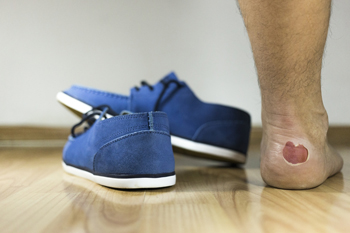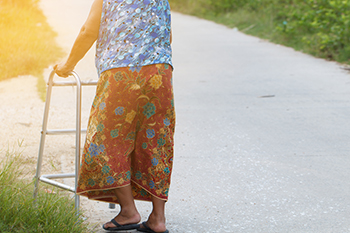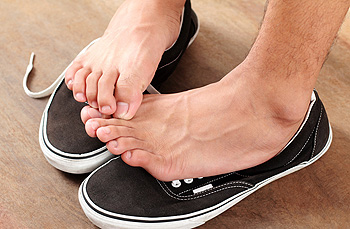Items filtered by date: February 2023
Stages of Blisters

There are many different ways to classify blisters on the feet. For example, sometimes foot blisters are classified by whether they are associated with another condition of the foot or whether they are linked to friction. However, another way to classify blisters on the feet is by assessing the state of the blister’s “roof,” or covering. Specifically, if the roof over the blister is fully covering the blister, then this blister is said to be “roof intact.” However, if the roof becomes slightly torn, then the blister is said to be “roof torn.” At this stage of the blister, infection is a possibility due to the torn roof. Lastly, if the roof has completely fallen off or been ripped off, then this is known as a “deroofed” blister. If you are someone that is prone to developing blisters on the feet, it is suggested that you schedule an appointment with a podiatrist.
Blisters are prone to making everyday activities extremely uncomfortable. If your feet are hurting, contact Dr. Odin De Los Reyes of Connecticut. Our doctor can provide the care you need to keep you pain-free and on your feet.
Foot Blisters
Foot blisters develop as a result of constantly wearing tight or ill-fitting footwear. This happens due to the constant rubbing from the shoe, which can often lead to pain.
What Are Foot Blisters?
A foot blister is a small fluid-filled pocket that forms on the upper-most layer of the skin. Blisters are filled with clear fluid and can lead to blood drainage or pus if the area becomes infected.
How Do Blisters Form?
Blisters on the feet are often the result of constant friction of skin and material, usually by shoe rubbing. Walking in sandals, boots, or shoes that don’t fit properly for long periods of time can result in a blister. Having consistent foot moisture and humidity can easily lead to blister formation.
Prevention & Treatment
It is important to properly care for the affected area in order to prevent infection and ease the pain. Do not lance the blister and use a Band-Aid to provide pain relief. Also, be sure to keep your feet dry and wear proper fitting shoes. If you see blood or pus in a blister, seek assistance from a podiatrist.
If you have any questions, please feel free to contact our offices located in Southbury and Farmington, CT . We offer the newest diagnostic and treatment technologies for all your foot care needs.
Outdated Medications and Eyeglasses May Lead To Falling

Many elderly people who fall go to emergency departments as a result of serious injuries. These may include a broken foot, ankle, toe, or other types of foot condition. It is beneficial for older patients to have routine physical and eye examinations performed. This is helpful in monitoring existing medications and eyeglasses that may cause dizziness and imbalance, which can possibly lead to falling. Many elderly have family members or caregivers who can help to improve lighting in the living environment and remove worn rugs from the steps. Additionally, the elderly person may feel more secure when there are grab bars installed in the shower and toilet area. Wearing shoes that fit correctly is an effective fall prevention technique, and using a walker or can improve mobility. If you would like more information about how to protect elderly people from falling, a podiatrist can give you efficient procedures.
Preventing falls among the elderly is very important. If you are older and have fallen or fear that you are prone to falling, consult with Dr. Odin De Los Reyes from Connecticut. Our doctor will assess your condition and provide you with quality advice and care.
Every 11 seconds, an elderly American is being treated in an emergency room for a fall related injury. Falls are the leading cause of head and hip injuries for those 65 and older. Due to decreases in strength, balance, senses, and lack of awareness, elderly persons are very susceptible to falling. Thankfully, there are a number of things older persons can do to prevent falls.
How to Prevent Falls
Some effective methods that older persons can do to prevent falls include:
- Enrolling in strength and balance exercise program to increase balance and strength
- Periodically having your sight and hearing checked
- Discuss any medications you have with a doctor to see if it increases the risk of falling
- Clearing the house of falling hazards and installing devices like grab bars and railings
- Utilizing a walker or cane
- Wearing shoes that provide good support and cushioning
- Talking to family members about falling and increasing awareness
Falling can be a traumatic and embarrassing experience for elderly persons; this can make them less willing to leave the house, and less willing to talk to someone about their fears of falling. Doing such things, however, will increase the likelihood of tripping or losing one’s balance. Knowing the causes of falling and how to prevent them is the best way to mitigate the risk of serious injury.
If you have any questions, please feel free to contact our offices located in Southbury and Farmington, CT . We offer the newest diagnostic and treatment technologies for all your foot care needs.
How to Treat a Foot Wound

Diabetic patients who develop foot wounds often understand the necessity of properly treating them. This begins with examining the bottom of the feet with a mirror to check for existing cuts. This is helpful in noticing small cuts and scrapes, and prompt treatment may prevent painful infections from developing. Common symptoms of an infected wound can include redness, swelling, and there may be pus that drains. Having a high temperature may accompany an infected wound, in addition to feeling unwell. A foot wound can be treated by cleaning it with warm water, followed by covering it with a protective dressing. It is beneficial that the bandage is changed daily, and walking is limited. If you have a foot wound that has become infected, it is strongly urged that you are under the care of a podiatrist who can effectively treat wounds on the feet.
Wound care is an important part in dealing with diabetes. If you have diabetes and a foot wound or would like more information about wound care for diabetics, consult with Dr. Odin De Los Reyes from Connecticut. Our doctor will assess your condition and provide you with quality foot and ankle treatment.
What Is Wound Care?
Wound care is the practice of taking proper care of a wound. This can range from the smallest to the largest of wounds. While everyone can benefit from proper wound care, it is much more important for diabetics. Diabetics often suffer from poor blood circulation which causes wounds to heal much slower than they would in a non-diabetic.
What Is the Importance of Wound Care?
While it may not seem apparent with small ulcers on the foot, for diabetics, any size ulcer can become infected. Diabetics often also suffer from neuropathy, or nerve loss. This means they might not even feel when they have an ulcer on their foot. If the wound becomes severely infected, amputation may be necessary. Therefore, it is of the upmost importance to properly care for any and all foot wounds.
How to Care for Wounds
The best way to care for foot wounds is to prevent them. For diabetics, this means daily inspections of the feet for any signs of abnormalities or ulcers. It is also recommended to see a podiatrist several times a year for a foot inspection. If you do have an ulcer, run the wound under water to clear dirt from the wound; then apply antibiotic ointment to the wound and cover with a bandage. Bandages should be changed daily and keeping pressure off the wound is smart. It is advised to see a podiatrist, who can keep an eye on it.
If you have any questions, please feel free to contact our offices located in Southbury and Farmington, CT . We offer the newest diagnostic and treatment technologies for all your foot care needs.
Heel Pain Can Be Treated!
Bacteria Can Cause Foot Odor

The feet have a total of 250,000 sweat glands. This vast collection can produce about a cup of sweat each day, more per square inch than any other body part. The feet contain eccrine sweat glands, which are designed to cool down the body. These consist mostly of salt and water and do not produce foot odor. Bacteria, which thrives in moist, warm environments such as sweaty feet enclosed in socks and shoes, does produce foul odors. Many types of bacteria live on the feet and interact with the sweat produced. Through a complex process involving the bacteria, the sweat glands, and the byproducts of those glands, foot odor is produced. The type of odor depends on which type of bacteria is present and thriving. Fortunately, there are a number of remedies and lifestyle changes available that can reduce the problem of extreme foot odor. For more information on how to handle this annoying problem, please consult a podiatrist.
Everyday foot care is very important to prevent infection and other foot ailments. If you need your feet checked, contact Dr. Odin De Los Reyes from Connecticut. Our doctor can provide the care you need to keep you pain-free and on your feet.
Everyday Foot Care
Often, people take care of their bodies, face and hair more so than they do for their feet. But the feet are a very important aspect of our bodies, and one that we should pay more attention to. Without our feet, we would not be able to perform most daily tasks.
It is best to check your feet regularly to make sure there are no new bruises or cuts that you may not have noticed before. For dry feet, moisturizer can easily be a remedy and can be applied as often as necessary to the affected areas. Wearing shoes that fit well can also help you maintain good foot health, as well as making it easier to walk and do daily activities without the stress or pain of ill-fitting shoes, high heels, or even flip flops. Wearing clean socks with closed shoes is important to ensure that sweat and bacteria do not accumulate within the shoe. Clean socks help to prevent Athlete’s foot, fungi problems, bad odors, and can absorb sweat.
If you have any questions please feel free to contact our offices located in Southbury and Farmington, CT . We offer the newest diagnostic and treatment technologies for all your foot and ankle needs.

